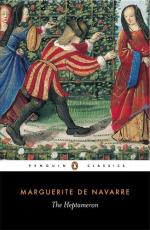“Since you desire me to atone for my fault,” answered Nomerfide, “I give my vote to Dagoucin, whose discretion is such that he would die rather than say anything foolish.”
Dagoucin then thanked her for the esteem in which she held his good sense, and thus began—“The story I am minded to relate is intended to show you how love blinds the greatest and most honourable hearts, and how hard it is to overcome wickedness by any kindness whatsoever.”
[Illustration: 093.jpg Tailpiece]
[Illustration: 095a.jpg The Grey Friar telling his Tales]
[The Grey Friar telling his Tales]
[Illustration: 095.jpg Page Image]
TALE XI. (B).
Of the jests made by a Grey Friar in his sermons. (1)
1 See ante, p. 89, note 2, and post. Appendix B.
Near the town of Blere in Touraine there is a village called St. Martin-le-Beau, whither a Grey Friar belonging to the monastery at Tours was summoned to preach during the seasons of Advent and Lent. This friar, who was more garrulous than learned, and now and then found himself at a loss for matter to eke out his hour, would thereupon begin telling tales which more or less agreeably satisfied the good villagers.
One Holy Thursday he preached about the Paschal Lamb, and while speaking of how it was eaten at night, seeing that there were present at the preaching some handsome young ladies of Amboise, who were newly arrived to keep Easter at the village, and to stay there for a few days afterwards, he wished to surpass himself, and thereupon asked all the women-folk whether they knew what it was to eat raw flesh at night. “I will tell you what it is, ladies,” he said, whereat the young men of Amboise, who had just arrived with their wives, sisters, and nieces, and who had no knowledge of the pilgrim’s humour, began to be scandalised; though on listening further their indignation gave place to laughter, even when he said that to eat the lamb it was needful to have one’s loins girt, one’s feet in one’s shoes, and one’s hand on one’s staff.
The friar, seeing them laugh at this, and guessing the reason, immediately corrected himself. “Well,” said he, “to have shoes on one’s feet and a staff in one’s hand; ’tis all one.”
That this sally was received with laughter you will readily believe. Even the ladies could not refrain from merriment, and for them he added other diverting sayings. Then finding the time was nearly up, and wishing the ladies to be well pleased with him when they departed, he said to them—“Now, fair ladies, when you are chatting presently with your gossips, you will be asking one another: ’Who, pray, is this Master Friar, that speaks out so boldly? He must be a brisk fellow.’ I will tell you, ladies, yes, I will tell you, and be not astonished if I speak out boldly, for I am of Anjou, at your service.”
With these words he ended his sermon, leaving his hearers more disposed to laugh at his foolish speeches than to weep in memory of our Lord’s Passion which was then being commemorated.




